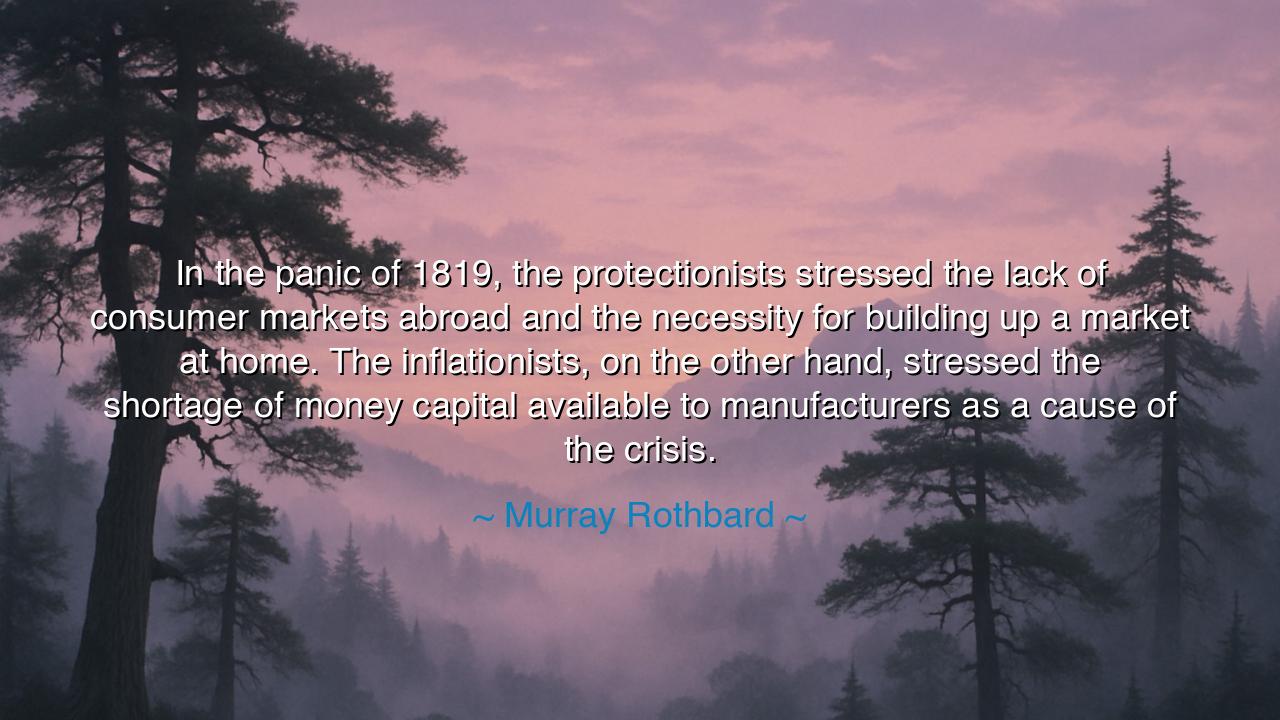
In the panic of 1819, the protectionists stressed the lack of
In the panic of 1819, the protectionists stressed the lack of consumer markets abroad and the necessity for building up a market at home. The inflationists, on the other hand, stressed the shortage of money capital available to manufacturers as a cause of the crisis.






In the scrolls of commerce, there is written a storm called the Panic of 1819—the first great convulsion of the young American market. Murray Rothbard, a scribe of careful numbers and stubborn memory, records how two tribes raised their banners over the wreckage. The protectionists cried that the republic lacked consumer markets abroad; therefore the nation must gird itself, raise the walls of tariff, and build a market at home. The inflationists answered that the smithies stood silent for want of money capital—that credit had dried like a river in drought, and the manufacturers were parched. Thus, in a single sentence, Rothbard teaches us how a crisis becomes a mirror: each faction sees in it the image of its creed.
To the protectionists, the world beyond the capes seemed cold and unwilling. Europe, weary from war, bought little; prices for staples sagged; ships returned with more salt spray than silver. Their remedy was simple and stern: fortify the home bazaar, nurse the infant industries, and bind the people to a common table where demand would never again depend upon distant winds. They spoke like farmers stacking grain against winter—patient, suspicious of foreign gusts, confident that the hearth, well-tended, could outlast the blizzard.
To the inflationists, the ailment lay not in customers but in coin. They pointed to shuttered banks, to the stern discipline of specie, to the Second Bank’s tightening hand. Where trade once ran, only pebbles glimmered; wages fell, inventories swelled, and orders died unborn. Their cure was a warming: more notes, easier credit, a loosening of the fetters so that enterprise might breathe again. They spoke like physicians who, finding a patient pale and shivering, kindled a fire and lifted a cup to the lips.
Yet the ancients would warn: storms seldom come from one sky alone. Before the crash there had been a feast—land speculation, wartime booms, debts stacked like cordwood, and a faith that prices would rise forever. When peace returned and policy shifted, the tide drew back, revealing how much of the city stood upon sand. Rothbard’s sentence, then, is not a quarrel’s gossip but a diagnosis of the human mind: when the earth shakes, we grasp the remedies we already favored, and we name them necessity.
Consider, for a human witness, a miller in Pennsylvania—call him Elias—who borrowed dear to expand his works when cotton and flour rushed forth at high prices. In 1819, shipments stalled, banknotes shrank, and his ledgers grew heavy with unpaid accounts. Relief laws murmured on the frontier; creditors knocked at doors in the East. Elias stood between two altars: one promised tariffs to steady demand, that his cloth might find buyers at home; the other promised credit to restart his wheels, that his men might return from idle benches. He did not need a philosopher to tell him the truth: he needed both a market that would purchase and a money-stream that would run. His story is the braided rope of the age.
And in Kentucky and the West, where farms were mortgaged to tomorrow’s sun, legislators tried “stay” and “replevin” laws to shelter debtors; courts disputed; families packed wagons; whole towns learned the arithmetic of foreclosure. The crisis did not ask whether one was protectionist or inflationist; it merely tallied exposure and demanded payment. In such seasons, theories become tools or trinkets, and policy proves its worth by whether granaries fill and workshops sing again.
What, then, is the teaching to pass to our children? First, that trade is a living tapestry—consumer markets and money capital are threads woven together. Fray either, and the cloth weakens. Second, that prosperity breeds illusions; prudence must stand guard even when drums are loud and sails are fat. Third, that monocausal blame is a sweet poison: it flatters our faction while leaving the wound unwashed.
Carry these actions like provisions for the road. (1) Diversify your markets: let no household, firm, or nation lean upon a single buyer far away. (2) Temper credit with clarity: borrow for tools, not for wishes; lend with cycles in mind, not merely seasons. (3) Read the small signals—inventory rising, orders slowing, lenders tightening—so that you may reef your sails before the gale. (4) In counsel and policy, refuse the easy banner; insist on remedies that honor both demand and finance, both the buyer’s table and the banker’s ledger. Thus you will walk wiser than the quarrel, and when the next wind turns, your house—founded on many pillars—will still be standing.






AAdministratorAdministrator
Welcome, honored guests. Please leave a comment, we will respond soon